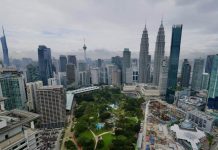- Malaysia can exceed RM1 trillion total exports target
- TEKUN has channeled over RM30 mln in financing for Sabah, Sarawak entrepreneurs this year
- 4 firms tie up with Education Ministry to upgrade TVET
- Singapore exports drop most in 6 years as electronics slump
- Hong Kong tourism, hotel occupancy falls as protests drag on
- Visa invests in Indonesian ride-hailing firm Go-Jek
Malaysia can exceed RM1 trillion total exports target
International Trade and Industry Minister Datuk Darell Leiking (pic) said, Malaysia is capable of exceeding the RM1 trillion total exports target this year, boosted by strong collaboration between various government agencies and private sectors. Last year, Malaysia recorded RM998 billion in total export, about 0.2 per cent short of surpassing the RM1 trillion threshold. “But this year we believe we will have an export growth around 3.4 per cent and hopefully we will be able to meet the said (RM1 trillion) target,” he told reporters in Kuala Lumpur. Datuk Leiking’s bullish statement today was in line with the optimism expressed by the Malaysia External Trade Development Corporation (MATRADE) yesterday, that the country’s total exports could breach the RM1 trillion mark this year due to all-round positive catalysts and economic outlook. Its chief executive officer Wan Latiff Wan Musa said from January to May this year, Malaysia’s total exports stood at RM405.36 billion, which was an increase of 0.3 per cent compared with the corresponding period last year. Datuk Leiking said Malaysia has a different kind of market and due to that unique feature has enticed many investors to set up their business in the country
TEKUN has channeled over RM30 mln in financing for Sabah, Sarawak entrepreneurs this year
The National Entrepreneur Group Economic Fund (TEKUN) has channelled financing of RM35.8 million to entrepreneurs in Sabah and Sarawak this year. Entrepreneur Development Minister Datuk Seri Mohd Redzuan Mohd Yusof said it covered RM18.9 million in funding to 1,173 Sarawak entrepreneurs and RM16.9 million to 1,951 entrepreneurs in Sabah. “Sarawak received the second highest funding this year, followed by Sabah in third place. Selangor was the top recipient, ” he said in Parliament. TEKUN had channelled more than RM700 million in loans to Sabah and Sarawak entrepreneurs since its inception in 1998 until May, he said.
4 firms tie up with Education Ministry to upgrade TVET
Four industry leaders today inked a certificate of collaboration (CoC) with the Ministry of Education to upgrade technical and vocational education and training (TVET). The four collaborating companies are Berjaya Corporation Bhd, Tropicana Corporation Bhd, Naza Group and Top Glove Corporation Bhd. The collaboration would emphasise the provision of training, facilities, workshops, career opportunities and networks for TVET students. Minister of Education, Dr Maszlee Malik said TVET is important in alleviating the mismatch in supply and demand of skills, future-proofing of students towards the Industrial Revolution 4.0 (IR4.0) and increasing graduate employability. “However, greater national efforts are needed to increase TVET enrolment and accelerate the upskilling of local talent, which calls for stronger collaborations and partnerships with industry leaders. “This CoC represents a large step that the public and private sectors are undertaking to take TVET to the next level. The ministry is committed to establishing many more ground-breaking partnerships, not just for TVET, but also to improve the overall education ecosystem of the country,” he said in his opening address.
Singapore exports drop most in 6 years as electronics slump
Singapore’s exports fell more than expected in June, marking their biggest decline in six years, as it struggles against tepid global demand and the Sino-US trade war. The grim trade numbers add to a slew of weak economic data and reinforce economists’ expectations that the central bank could ease monetary policy at its October meeting. Non-oil domestic exports (NODX) fell 17.3 per cent in June, marking the fourth straight month of year-on-year decline, data from trade agency Enterprise Singapore showed today. This was worse than the 9.9 per cent contraction predicted by 10 economists in a Reuters poll, and the biggest decline since February 2013 when exports fell 33.2 per cent from the year before, Refinitiv Eikon data show. “The outlook (for Singapore’s economy) is definitely more pessimistic now,” said Maybank Kim Eng economist Lee Ju Ye. Singapore’s economy grew just 0.1 per cent in the second quarter, its slowest annual pace in a decade, according to official estimates released last Friday. The latest growth number reflects heightened uncertainties and risks in the global economy, especially with US-China trade tensions, said Deputy Prime Minister Heng Swee Keat after the GDP data was released. However he said the Government was not expecting a full-year recession for the Singapore economy, pointing to areas of strength such as the information and communications and construction sectors. On Tuesday, the International Monetary Fund trimmed its 2019 economic growth forecast for the country to 2 per cent from 2.3 per cent, citing global trade tensions.
Hong Kong tourism, hotel occupancy falls as protests drag on
Hong Kong tourism numbers are falling and hotel occupancy rates are slumping after the city was rocked by sometimes violent political protests over the last month, adding pressure on its already struggling economy. The declines reported today came a day after Hong Kong retailers warned that July and August sales could drop by double-digits from a year earlier as tourists put off their visits. Like many export-reliant Asian economies, Hong Kong has been hit hard by the year-long US-China trade war, and grew at its slowest pace in nearly 10 years in the first quarter. Commerce and economic development secretary Edward Yau said on Wednesday he saw “negative signals” from the economy beyond known declines in trade, retail and cargo freight posted in the first five to six months. “Three weeks ago I met with the tourism sector and they expected a 5 to 10 per cent impact, but now the hotel sector is worried the impact would be larger,” Yau told reporters. The Hong Kong Federation of Trade Unions said on Wednesday the number of tour groups from mainland China has declined to 5,641 in June from a monthly average of 7,800 in the beginning of the year. Hotel occupancy rates fell as much as 20 per cent in June from a year earlier, and are expected to drop 40 per cent in July on-year, it said. Hong Kong is one of Asia’s most popular tourist destinations and a global financial hub.
Visa invests in Indonesian ride-hailing firm Go-Jek
Visa said it has invested in Indonesia’s Go-Jek as part of the ride-hailing company’s ongoing Series F fundraising round. The two companies will work together to provide more options for cashless payments for consumers across Indonesia and Southeast Asia, the U.S. payment processor said.














